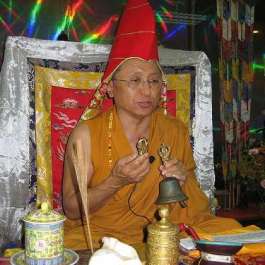In the early 1990s, when my family first moved to England from India, we settled in the city of Birmingham. Birmingham grew to prominence during the Industrial Revolution, and became home to Jaguar cars and BSA (Birmingham Small Arms) Motorcycles. In Birmingham we lived close to Karma Ling—a small Kagyu Buddhist center nestled amongst the Victorian terraces of Edgbaston and a stone’s throw away from Perrot’s Folly and the Waterworks Tower, rumored to have fired the imagination of a young J. R. R. Tolkien.
The center was different from the monastery near where we had lived in India, as most of the members and visitors were not Tibetan but British. One member, Simon, stood out as not only could he speak colloquial Tibetan fluently, but he could read and write classical Tibetan—something that many Tibetans themselves struggle to do. Having studied literary Tibetan later in life myself, I am aware how difficult the Tibetan language can be for learners, and so I grew to really appreciate that someone had mastered such an obscure foreign language. Knowing that Simon had learned the Tibetan language through his exploration of Tibetan Buddhism, I decided to interview him about his first encounter with Buddhism and how his relationship with the religion has developed over time.
Born in the northeast of England, Simon was brought up in the Church of England. “My family was very much involved in the church,” he told me. “The vicar was a family friend. I sang in the church choir and even read the Bible daily. I remember being rather perturbed that the vicar thought that I, too, would enter the priesthood, but felt it was probably inevitable. Living in a little village, I was not particularly exposed to other religious systems and simply assumed that the Christian way was the only way.”
Not growing up around Buddhists, Simon’s first encounter with Buddhism was, as it is for many people, through television (albeit in a somewhat surreal fashion). “My first actual exposure to Buddhism was on the TV show Doctor Who! In ‘The Planet of the Spiders,’ a Buddhist cult summoned giant spiders on a picture of the Wheel of Life by frantically recited Om Mani Padme Hum. I remember, at the age of six, reciting the mantra after the program rather nervously just in case a spider appeared! The Monkey show and Tripitaka’s weekly advice to the monkey god was another favorite. I never imagined that I myself would become Buddhist. However, by the time I was 16, my care for animals had led me to give up eating meat.”
Simon would have to wait until he moved to Birmingham in 1985 to take up a place to study English Language and Literature at the university before encountering Buddhism in the flesh. “At the university, I was drawn to one of the lecturers who seemed particularly intelligent and questioning, so I chose all of his courses. He was the first Buddhist I had met. I taught his daughters piano, and one evening, when he was driving me home, he pointed out that I lived just around the corner from two old Tibetan lamas. Sometime later, feeling that I was having difficulty concentrating, I asked him to teach me how to meditate. He encouraged me to attend the lamas’ center and to learn properly. I felt very much at home in the center, and 28 years later I am still here!”
I asked what it was about Buddhism that had drawn him so strongly. “Buddhism addressed all my needs: care for animals, respect for all, intellectual rigor, psychological investigation, and feminist issues,” he told me.
As a result, Simon quickly threw himself into Buddhist studies and practice. “I took the Refuge vows after a couple of months with the 12th Kenting Tai Situpa and participated in all the events I could. I practiced meditation and did other practices at home on a daily basis. Six months after taking Refuge, I took the Five Genyen Vows [the Five Lay Precepts] and the Bodhisattva Vow with Kalu Rinpoche. As well as attending the practice sessions at Karma Ling, my practice was supported by the nuns and monks of the center throughout this time.”
After graduating from university in 1988, Simon moved into the center as resident administrator, which allowed him to further develop his practice. “I began daily ritual classes with Palpung Lama Lodro Rabgyay and served as an attendant to Palpung Lama Thupten Namgyal. Over two years, I completed the Mahamudra preliminary practices and learned Tibetan well enough to receive instruction directly in Tibetan. Following the preliminary training, I began regular month-long retreats on other practices, notably the Eight Nyungne Chenrezig practice, which I have done annually to this day.
“In 1992, I also made my first of four trips to India for pilgrimage, and following this, concentrated on preparing for the three-year Naropa retreat at Samye Ling in Scotland. I began the retreat in 1993 and completed it in 1997. After the retreat, I returned to Karma Ling and found myself in a pastoral and teaching role. I continue practicing, studying, and interpreting when needed. I have been able to stay at Sherab Ling near Bir in India for two two-month periods to hear Kenting Tai Situpa. And for the past seven years, I have also studied there for a month each year with Khenpo Lhabu, which has enabled me to deepen my understanding of Buddhist philosophy.”
Simon’s encounter with Buddhism clearly had a profound effect on the course of his life. Despite having dedicated such an impressive amount of time to study and practice, he is still keen to better put into practice the precepts of Buddhism. “My wish is to be truly Buddhist by the time I die, and I train whenever I remember, which is fortunately more and more regularly,” he explained. “I live within the Five Precepts and attempt to live within a Buddhist view.”
This article is one of a series on how Buddhism has impacted the lives of practitioners. We welcome you to send us your own story.







